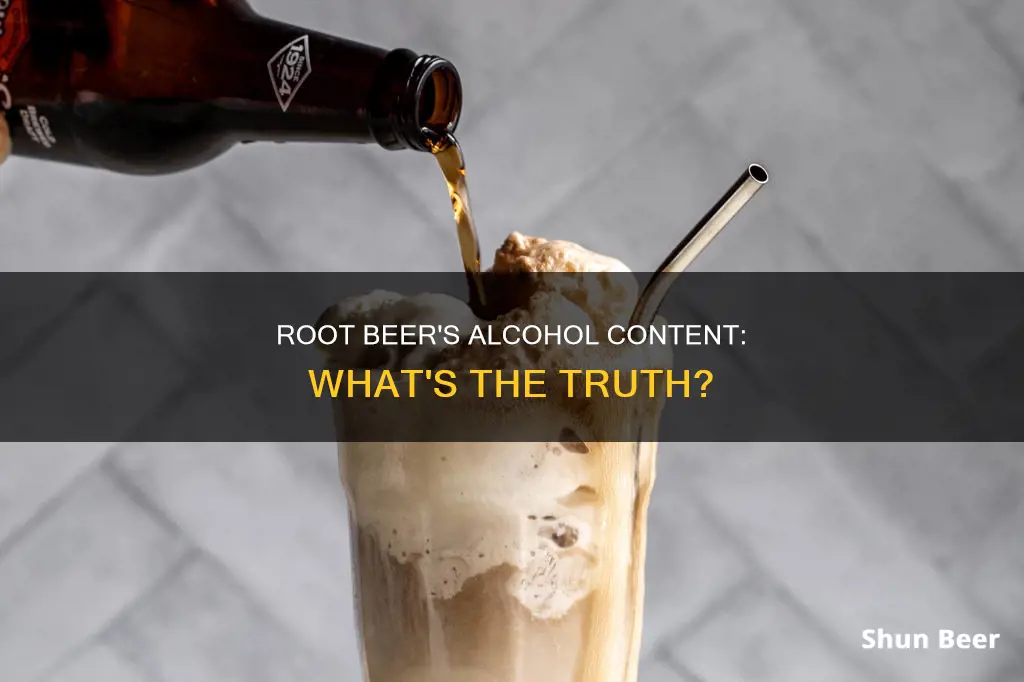
Root beer is a sweet, carbonated soft drink that originated in North America. It is typically non-alcoholic, but there are exceptions. The drink is usually made using the root bark of the sassafras tree or the vine of the sarsaparilla plant. Root beer was originally fermented and alcoholic, but modern root beer is artificially flavoured and carbonated. While most commercial root beers are non-alcoholic, some varieties do contain alcohol.
| Characteristics | Values |
|---|---|
| Is root beer an alcoholic drink? | No, root beer is a soft drink. However, it is sometimes used as a mixer for alcoholic cocktails. |
| History | Root beer was originally at least 2% alcoholic. |
| Taste | Root beer has notes of vanilla, mint, ginger, juniper, and anise. |
What You'll Learn

Root beer is typically non-alcoholic
Root beer was originally brewed from the tradition of small beer, which was a low-ABV brew that was safer to drink than the contaminated water of Medieval Europe. Early root beers were at least 2% alcoholic. However, the first commercial root beer was produced by a teetotaler, and after Prohibition, root beer became definitively non-alcoholic.
Despite this, root beer is often used as a mixer in cocktails, such as the Root Beer Rum Cream, which includes dark spiced rum and Baileys Irish Cream liqueur, or the Root Beer White Russian, which includes vodka, Kahlua, and cream. Root beer can also be used in adult versions of the classic root beer float, with the addition of vanilla vodka and vanilla ice cream.
Beer, Cigarettes, and ED: Is There a Link?
You may want to see also

Traditional root beer can contain 2% alcohol
Root beer is a sweet, soft drink that originated in North America. It is typically non-alcoholic, caffeine-free, sweet, and carbonated. However, traditional root beer can contain 2% alcohol or less.
Root beer's roots are tied to beer, which is why the word "beer" appears in its name. Early versions of beer were often brewed to make water safer for consumption. Before the 19th century, drinking water could be dangerous due to contamination. Fermented beverages were known to be safer, leading people to consume low-alcohol beers, also known as small beers, instead of water. Early root beers were born out of this small beer tradition, with people adding the roots of sassafras and sarsaparilla plants, which were thought to have medicinal properties.
The process of making traditional root beer involves cooking a syrup from molasses and water, letting it cool for about three hours, and then combining it with root ingredients such as sassafras root, sassafras bark, and wintergreen. Yeast is then added, and the beverage is left to ferment for about 12 hours before being strained and rebottled for secondary fermentation. This fermentation process is what results in the small amount of alcohol in traditional root beer.
The first commercial root beer was created by pharmacist Charles Elmer Hires in 1875. He initially called it "root tea" and wanted to market it as a temperance drink. However, he eventually named it "root beer" to appeal to Pennsylvania coal miners, and the non-alcoholic version became widely distributed across the United States.
Today, most commercial root beers are non-alcoholic and artificially flavoured, as sassafras, a key component, was banned by the U.S. Food and Drug Administration in 1960 due to its carcinogenicity. However, some traditional and homemade root beers still contain small amounts of alcohol due to the fermentation process.
Carrying a Concealed Weapon and Drinking Beer in Virginia
You may want to see also

Alcoholic root beer has grown in popularity
Root beer has a long history in North America, dating back to at least the 18th century. It was originally made with sassafras root and bark, which gave it its distinctive flavour and natural, long-lasting foam. While sassafras is no longer used due to safety concerns, root beer remains a popular soft drink, with major producers including PepsiCo, Coca-Cola Company, and A&W.
In recent years, however, there has been a resurgence in the popularity of alcoholic root beer. This trend combines the familiar flavour of root beer with the added kick of alcohol. One of the earliest examples of this trend is Not Your Father's Root Beer, which was introduced in the 2000s and has an ABV of 5.9%. This beverage offers a subtle presence of alcohol, with the familiar taste of root beer taking centre stage.
The rise in popularity of alcoholic root beer can be attributed to several factors. One reason may be the growing interest in craft beverages, including craft beer and craft soda. Consumers are increasingly seeking out unique and innovative drinks, and alcoholic root beer certainly fits the bill. Additionally, the nostalgic appeal of root beer, which evokes childhood memories of root beer floats and old-fashioned confectionery stores, may also be a factor in its growing popularity among adults.
Another factor contributing to the popularity of alcoholic root beer is its versatility in cocktails. Mixologists have embraced root beer as a mixer, pairing it with spirits such as bourbon, rum, and Irish cream liqueur to create complex and unexpected flavour profiles. The distinctive bite and earthy notes of root beer complement the sweetness of bourbon, while its vanilla notes enhance the creaminess of rum-based drinks.
The growing demand for alcoholic root beer has led to increased availability. While it may not be as ubiquitous as other cocktails, consumers are increasingly able to find root beer cocktails at bars and restaurants, or opt to create their own at home. The rise in popularity of alcoholic root beer shows no signs of slowing down, and it is likely that we will continue to see innovative and unexpected takes on this classic beverage.
Beer and Health: One Drink, Any Benefits?
You may want to see also

Root beer is artificially flavoured and carbonated
Root beer is a distinctively flavoured carbonated soft drink that has become a popular mixer in cocktails. Its unique, earthy flavour is derived from sassafras root, with notes of vanilla, mint, ginger, juniper, and anise.
The drink has a long history, evolving from the tradition of small beer—low-ABV brews that were safer to drink than the contaminated water of Medieval Europe. Early root beers were at least 2% alcoholic. However, the first commercial root beer was produced by a teetotaler, and the drink became definitively non-alcoholic during Prohibition.
Today, root beer is a popular mixer in cocktails, with bartenders praising its ability to enhance the flavours imparted by whiskey barrels. It is often mixed with spirits such as rum, bourbon, and vodka, and is a common ingredient in boozy floats and creamy cocktails.
While root beer is no longer alcoholic, it is now a versatile mixer, adding a unique twist to many cocktail recipes. Its complex flavour profile and carbonation make it a natural addition to spirits, enhancing and complementing their flavours.
Yoga and Beer: A Relaxing, Fun Workout
You may want to see also

Root beer is a soft drink
Root beer was originally brewed like beer, and early versions were at least 2% alcoholic. However, the method of brewing it evolved from the tradition of small beer, which was a low-ABV brew that was safer to drink than the contaminated water of Medieval Europe. The first commercial root beer was produced by a teetotaler, and it became definitively a soft drink during Prohibition.
Today, root beer is a popular soda with notes of vanilla, mint, ginger, juniper, and anise. It is often used as a mixer for cocktails, including boozy root beer floats, and pairs especially well with whiskey.
Drinking Beer and Riding a Bike: Is It Safe?
You may want to see also
Frequently asked questions
Root beer is typically, but not always, non-alcoholic. It is a sweet, carbonated drink that is usually non-alcoholic and caffeine-free.
Root beer is traditionally made using the root bark of the sassafras tree or the vine of the sarsaparilla plant for flavour. It is carbonated by adding yeast, but it is consumed before it becomes alcoholic. Modern root beer is artificially flavoured and carbonated with sugar and carbon dioxide.
Yes, alcoholic root beer has been produced, including Small Town Brewery's Not Your Father's Root Beer, Coney Island Brewing Co.'s hard root beer, and Best Damn Brewing Co.'s Best Damn Root Beer.







